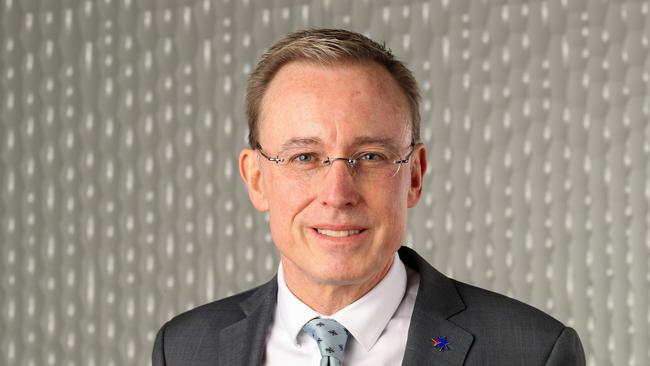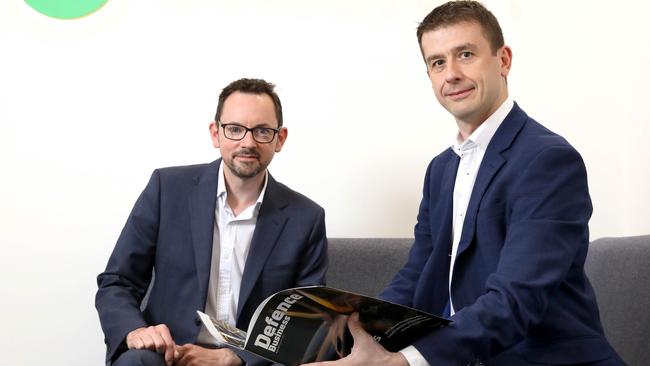Business confidence fell off a cliff after we opened our borders, but Business SA is optimistic
Business confidence turned sharply negative in recent months following the opening of SA’s borders, but Business SA is confident stimulus measures will help turn the tide.
Business
Don't miss out on the headlines from Business. Followed categories will be added to My News.
Business confidence in South Australia took a predictable clobbering in the final quarter of last year, but Business SA chief executive Martin Haese believes the trajectory from here is firmly positive.
The organisation’s quarterly Survey of Business Expectations shows that business confidence fell from 106.1 points in the September quarter to 80.8, where a reading of 100 is neutral.
While the plunge was steep, confidence levels remain well above the dire level of 41 points recorded at the state of the epidemic in March 2020, with that reading taken before the JobKeeper stimulus package was announced.
The latest survey results were collected between the reopening of SA’s borders, which were accompanied with the end of the state’s Covid-zero status, and recent stimulus announcements from the State Government, which Mr Haese said gave him confidence that the trend from here would be positive.
“We released the survey only a week after businesses felt disappointed that the easing of restrictions was not taking place,’’ Mr Haese said.

“However, shortly after we closed our Business SA William Buck Quarterly Survey of Expectations, Premier Marshall and Treasurer Lucas came out with multiple stimulus and support announcements and the easing of restrictions.
“These recent announcements are injecting that magic ingredient of confidence.’’
The State Government recently doubled the amount which eligible tourism, hospitality and gym businesses could receive under their latest stimulus support to $44,000, with some of those payments flowing through last week.
An extension of payroll tax deferrals, another two rounds of Great State vouchers and $1m for the City of Adelaide to deliver a citywide activation plan were also announced in late January.
Many hospitality businesses are still unhappy however, with some vowing to deny entry to Premier Steven marshall should he attempt to enter their premises.
Mr Haese said the measures were positive and “frankly, we’re already on the way up with this recent injection of $50m, the rolling reviews of restrictions and the fact that we’re now over 90 per cent vaccinated as a state.”
Business SA director of policy and advocacy Kendall Crowe said an encouraging finding from the survey results was that nearly half of all respondents were planning to invest in new plant, equipment or machinery over the next 18 months.
“Business confidence has taken a hit, but we can be buoyed by the fact that so many businesses are still investing in their own operations,’’ he said.
“There is still more work to do to get people back into their offices to support their local businesses, especially in the City of Adelaide. We will continue to push for the public sector to return to the workforce as corporates will follow suit.’’
Staff management a headache
The fight for talent is hitting hard, with business owners and staff having to work more overtime, recruitment of new workers difficult, and close-contact rules during the December quarter knocking a lot of employees out of the rotation.
The Business SA William Buck Survey of Business Expectations for the December quarter shows business confidence dropped sharply following the opening of domestic and international borders on November 23.
The business confidence measure fell 25.3 points to 80.8 where 100 is a neutral reading.
However, Business SA chief executive Martin Haese, pictured, says this was before the most recent round of state government stimulus measures, and he was optimistic about a turnaround in the current quarter.
But businesses will have to contend with elections at the both the state and federal level, a lack of skilled workers as the unemployment rate continues to fall, and the slew of difficulties the pandemic still poses, such as supply-chain pressures, capacity restrictions and close-contact rules.
“Without trivialising matters, the pandemic has certainly caused us to expect change,’’ Business SA says in the survey, which was released on Tuesday.
“South Australia’s business sentiment between October and December 2021 was bleak, particularly for CBD businesses, when the survey was conducted (January 17-24).
“However, the magic ingredients of economic stimulus and financial support announced on January 29 by the government of SA are expected to impact conditions and confidence positively.’’
Business conditions came in at 86.6 points for the quarter and are expected to fall further to 83.8 points.
However, again, this measure was taken before the stimulus was announced.
Business owners report struggling with large amounts of overtime, staff shortages and the need to work extra hours themselves to cover shifts.
“The last two years have seen overtime soar, as almost 34.5 per cent of businesses reported increased overtime as they try to source labour and cover hours lost from staff isolating or quarantining,’’ Business SA says.
“Since the reopening, 75.9 per cent of SME (one to 50 employees) business owners and managers have worked extra hours to cover staff shortages.’’
Business SA says people should expect “little reprieve’’, with the unemployment rate in SA sitting at just 3.9 per cent “and the expectation that it remains at that level’’.
“Not surprisingly, businesses reported they have experienced increased competition for staff in their industry, with some businesses seeing workers poached from other businesses.’’
And while restrictions on hospitality traders have been gradually easing, participants in the sector remain downbeat about the short-term outlook.
“(A total of) 79.4 per cent of hospitality businesses forecast sales to be below 70 per cent of pre-Covid revenue at the end of the March quarter 2022,’’ Business SA says.
“The state government’s recent financial support and stimulus package, and restrictions easing in time for the Fringe/Festival period, will certainly improve confidence.’’
Regarding the reopening of the borders in November, 23 per cent of businesses said that it had a negative impact and 21 per cent said it was “very negative’’. Of the remainder, 37 per cent said it was neutral, 12 per cent positive and 6 per cent very positive.
“The city economy is at the epicentre of the damage caused by the Omicron wave, and, in particular, hospitality, tourism and retail businesses have borne the brunt,’’ Business SA says.
“The recent (post-survey period) announcement that public sector workers should return to the office is most welcome, and we expect the private sector to do the same to further support businesses in dire need of customers.’’
Consunet staying positive

With the benefit of steady conditions and longer-term projects, Consunet know they have been fortunate to continue operating through these challenging times.
Consunet executive chairman Kuba Kabacinski appreciates that his company is considerably different from those in customer-facing industries such as hospitality or manufacturing, with many staff on the factory floor.
“It hasn’t all been smooth sailing though,’’ Mr Kabacinski said.
“We have seen higher levels of unease and uncertainty in our staff. We expect significant amounts of personal leave to be taken as our staff increasingly become exposed to the virus.
“More broadly, it has been really tough for South Australian businesses, with the conditions and confidence reported in the Business SA William Buck Survey of Business Expectations certainly reflecting this.
“It has been challenging because of broader market factors such as labour supply shortages, supply chain deficiencies, rising inflation and continued Covid-19 impact. All of this constrains business growth.”
Many of Consunet’s Covid-19 challenges centred around the vulnerabilities of a distributed workforce increasing the risk of fraud that working from home brings to many businesses.
“While we have been fortunate to have most of our staff able to work from home, as a cyber security business, we’ve recognised the additional cyber risks that come along with staff working outside of the corporate environment”, Mr Kabacinski said.
“With any security measure, there are trade-offs between convenience and security.
“You want your staff to have the ease to undertake their role as they would in the office environment. But you have to protect your operations from a range of cyber risks. And we have also paid close attention to the other risks that come along with staff working remotely at home, such as their wellbeing and safety.”
Mr Kabacinski recognises that for staff working from home, the employer still has a legal duty of care to protect them while they undertake the duties they are employed for.
“In the office, we can control the environment and make sure it is safe for staff to carry out their duties. But in the home environment, though, while I am legally responsible for our people, it is more challenging to ensure safety to the same degree we do in the office,” he said.
Over the 2020–21 financial year, the Australian Cyber Security Centre received over 67,500 cybercrime reports, an increase of nearly 13 per cent from the previous financial year. “While many South Australian businesses are dealing with Covid-19 related impacts, they must also consider the damage that a cyber attack can do,’’ Mr Kabacinski said.



